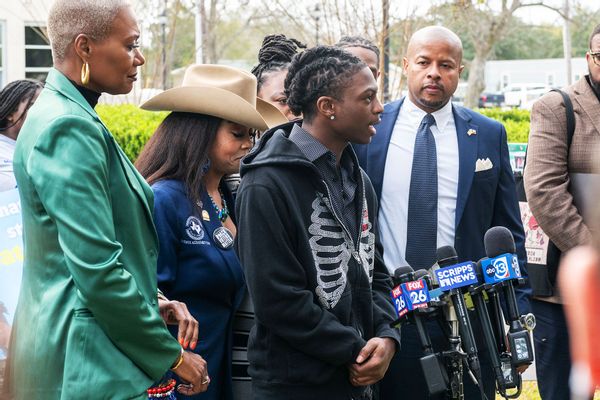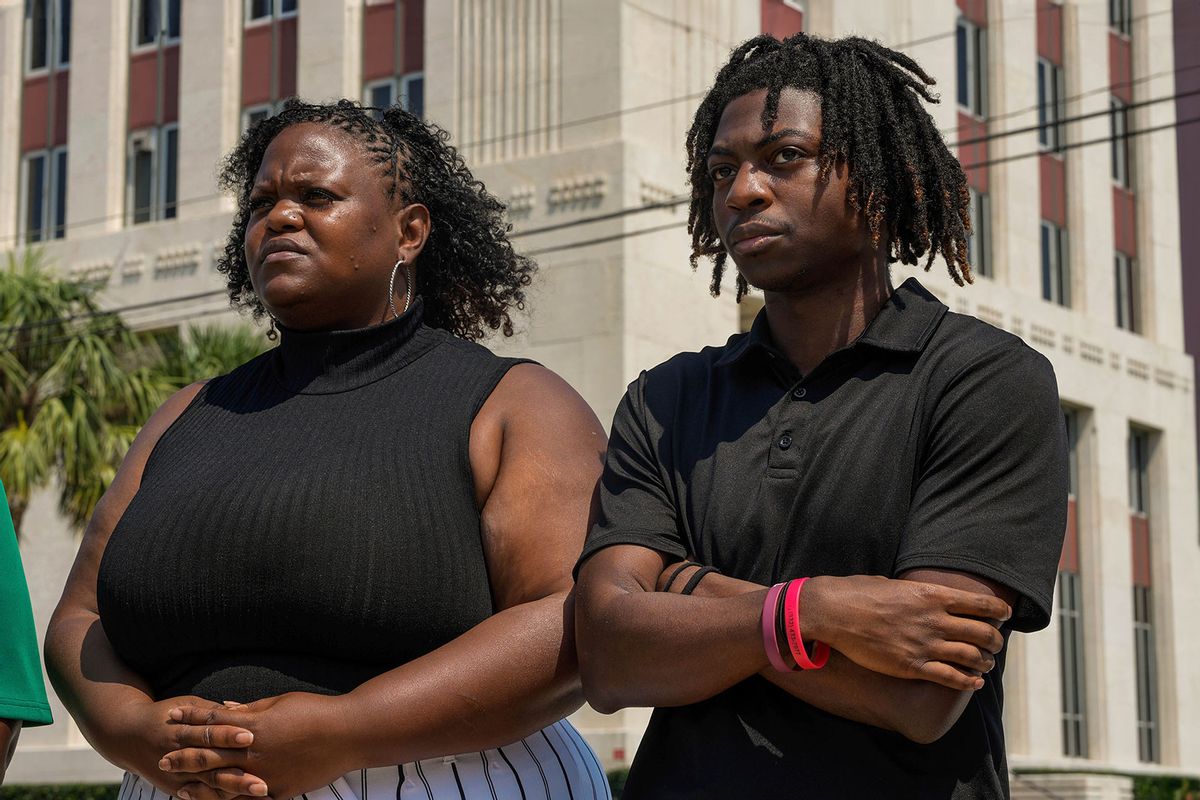A federal judge this week dismissed a majority of the claims in a Black Texas high school student's lawsuit against his school district, which accused officials there of racial and gender discrimination for punishing him over his refusal to change his hairstyle. Legal experts told Salon that while the axed racial discrimination claim didn't have strong legs, thanks in part to a controversial Supreme Court doctrine of "colorblindness," the suit's remaining sex discrimination allegation has the potential to have major reverberations.
The order dealt another blow to 18-year-old Darryl George, a state judge earlier this year having found his school district's hair-length policy did not violate a new state law that aimed to prohibit race-based hair discrimination.
The Houston-area Barbers Hill Independent School District has argued that it's policy restricting male student's hair length is meant to teach grooming and instill a respect for authority, according to The Associated Press. Its superintendent praised the recent court ruling in a statement, blaming "cancerous cancel culture" for accusations of racism.
In his order, U.S. District Judge Jeffrey Vincent Brown said he tossed George's claims of racial discrimination on the grounds that he had not sufficiently shown “a persistent, widespread practice of disparate, race-based enforcement of the policy."
“At most, the plaintiffs allege only two instances: the allegations underlying George’s case and those underlying the Arnold case also pending in this court,” Brown wrote in the 30-page order, referencing another case of a Black teen who was suspended over his hair. “But these two instances alone are insufficient to establish a pattern of conduct going on ‘for so long or so frequently’ that it evinces a ‘persistent, widespread practice.’”
Richard Thompson Ford, a Stanford University professor of anti-discrimination law, told Salon that he wasn't "all that surprised" the court dismissed the race discrimination claim because the school's policy on haircuts does not "formally discriminate on the basis of race."
"The Supreme Court's colorblindness doctrine tells us to ignore race – even if it is relevant"
"The claim of race discrimination requires one to accept that certain grooming practices are extraordinarily important to some racial groups — either because they are well suited to natural hair texture or because of their cultural significance," Ford, who's also the author of "Dress Codes: How the Laws of Fashion Made History," said. "These claims are controversial, and they’ve really only started to get traction over the last 10 or so years."
The dismissal is also consistent with a "widely criticized Supreme Court doctrine" that mandates that equal protection plaintiffs prove discriminatory intent, added Darren Hutchinson, an Emory University law professor who focuses on anti-discrimination law.
Without explicit reference to a category like race, sex or sexual orientation, he explained, courts will likely find policies like Barbers Hill's constitutional. While other courts have held that "disparate effects of the policy could stand as evidence of discriminatory intent," many have been "reluctant to apply this theory" even as it forms the basis of statutory reforms.
"I believe that this court missed the opportunity to think honestly about race as a social construct, rather than a biological fact," Hutchinson told Salon, noting that certain cultural norms and attitudes develop from shared experiences and ancestry.
"The Supreme Court's colorblindness doctrine tells us to ignore race – even if it is relevant," he said. "Based on this approach, courts have upheld English-only and grooming policies that disparately affect people of color in school and in the workplace. These are forms of racism in effect, regardless of intent."
We need your help to stay independent
For most of the 2023-24 academic year, George had been barred from attending his usual high school courses because the school district said his hair length violated its dress code. As a result of the discipline the district instituted, George spent his junior year either serving in-school suspension at Barbers Hill high school or at an off-site disciplinary program.
The district has maintained that George's long hair — dreadlocks that he would typically wear to school twisted back and tucked — breached its policy for boys' hair length because, if let down, George's hair would fall below his earlobes, eyebrows or shirt collar. The district has said that other students with locs follow its hair-length rule.
George and his mother, Darresha George, filed the federal civil rights suit against the school district and its superintendent, his principal and assistant principal, Texas Gov. Greg Abbott and Attorney General Ken Paxton last fall.
They alleged that George being punished amounted to a violation of the CROWN Act, a state law that took effect last September that prohibits race-based hair discrimination; the measure bars employers and schools from penalizing people because of hair texture or protective hairstyles, including twists, locs, Afros and braids. The suit also argued the school district disparately enforced its hair policy on Black students and violated George's First Amendment rights to free speech and expression through the rule.
In addition to dismissing George's claims of racial discrimination, Brown tossed the lawsuit's claim that the teen's First Amendment rights were breached, noting that George's lawyer could not provide any case law that held hair length "is protected as expressive conduct under the First Amendment."
 Darryl George, center, makes a comment during a press conference before a hearing regarding Georges punishment for violating school dress code policy because of his hair style, Feb. 22, 2024 at the Chambers County Courthouse. (Kirk Sides/Houston Chronicle via Getty Images)
Darryl George, center, makes a comment during a press conference before a hearing regarding Georges punishment for violating school dress code policy because of his hair style, Feb. 22, 2024 at the Chambers County Courthouse. (Kirk Sides/Houston Chronicle via Getty Images)
A number of other claims arguing George's 14th Amendment rights to due process were being violated also received the ax, and the judge removed Abbott, Paxton, the district superintendent and other faculty from the case.
Brown, however, did retain George's claim of sex discrimination, citing the school district's lack of clearly defined reasoning for the "sex-based distinctions" in its dress code, such as allowing girl's to maintain long hair but not boys.
Ford and Hutchinson said that the sex discrimination claim was the strongest in George's lawsuit because the policy clearly discriminates on the basis of sex. Hutchinson noted that the school district, in defense of its "discriminatory policy," cited a 1972 case that's status as precedent has since been made moot in the wake of the Supreme Court holding that sex discrimination violated the constitution. "Modern doctrine," he said, "treats sex discrimination as presumptively unconstitutional."
"Although historically courts have allowed such policies, the legal justification for doing so has always been a bit murky: usually courts just say policies based on conventional norms are acceptable," Ford said, adding that the reason why is unclear. "Sexism itself is a conventional norm — but it is precisely what anti-discrimination laws are designed to combat."
An attorney for the George family, Allie Booker, told Salon that, despite others telling her she should be upset that the race discrimination claims were dismissed, she's instead "happy" that the case will now have a broader impact.
"Now, this exclusive trip is all inclusive ... all aboard, white, black, yellow, brown, green, blue, red ... all aboard!" she said in a statement. "We will stand together against the injustice because this injustice affects all men, not just Black men."
Darresha George, expressed a similar sentiment, telling local news outlet Click 2 Houston that the family is continuing to pursue the case because it's about more than just her son.
“It’s about every male in this school district that’s born in the school district, that moves to this school district, that has to be in this school district. It’s about everyone in this school district. It’s not just about Darryl,” she said.
Judge Brown's order comes months after a state judge ruled in February that the punishment the school implemented over George's refusal to cut his hair in accordance with its policy did not constitute a violation of the CROWN Act. The district had filed the declaratory judgment suit last September seeking the court's opinion.
Want a daily wrap-up of all the news and commentary Salon has to offer? Subscribe to our morning newsletter, Crash Course.
When approached for comment, a school district spokesperson directed Salon to a statement posted to its website in which Superintendent Greg Poole said the court's decision "validates what our district has maintained through this ordeal ... [that] high expectations for all students in all things are not racist."
"Our policies and our procedures for 95 years have been established by our community via a locally elected board of trustees," Poole continued. "Our district will not succumb to a cancerous cancel culture that seeks to intimidate, falsely accuse and use race in a disingenuous way to serve a political end."
Barbers Hill's hair-length policy had previously been challenged in a May 2020 lawsuit from two other students. Both eventually withdrew from the high school, but one returned after a federal judge granted a temporary injunction because of the "substantial likelihood" that the the student's rights to free speech and protection from racial discrimination would be violated should he not be allowed to attend the school. That lawsuit, according to the AP, is still pending.
Hutchinson argued that George's case could become a "huge legal advancement" given that plaintiffs have spent decades attempting to challenge similar policies to no avail. Courts have "made questionable rulings that stretched reasoning to justify sex discrimination, including children have fewer rights in schools," Hutchinson said, an argument the district court rejected in this case.
What the outcome of George and his family's legal challenge will ultimately be is hard to predict, Ford said. While legal precedent declaring hair-length restrictions on men and boys lawful exists — and the trial will offer the school district the opportunity to defend its policies — "times are changing and increasingly courts are scrutinizing such gender-specific policies more closely."
At the end of his ruling, Brown, the federal judge, questioned the utility of the school district's policy and whether it was more harmful than helpful, even if it proves to be lawful. He pointed to a 1970 case against a school district in El Paso, Texas, that tried to bar a male student from enrolling because his hair length violated district rules.
The judge's ruling, which was later overturned on appeal, had concluded that "the presence and enforcement of the hair-cut rule causes far more disruption of the classroom instructional process than the hair it seeks to prohibit."
“Regrettably, so too here,” Brown wrote, referring to George’s case.



Shares